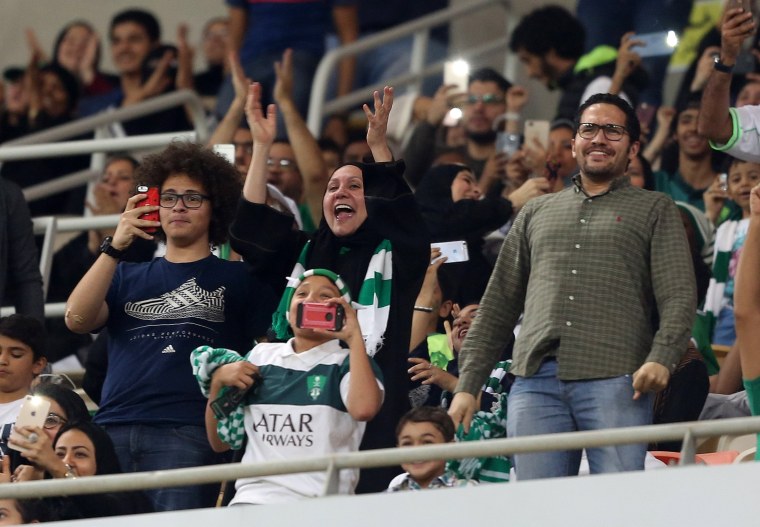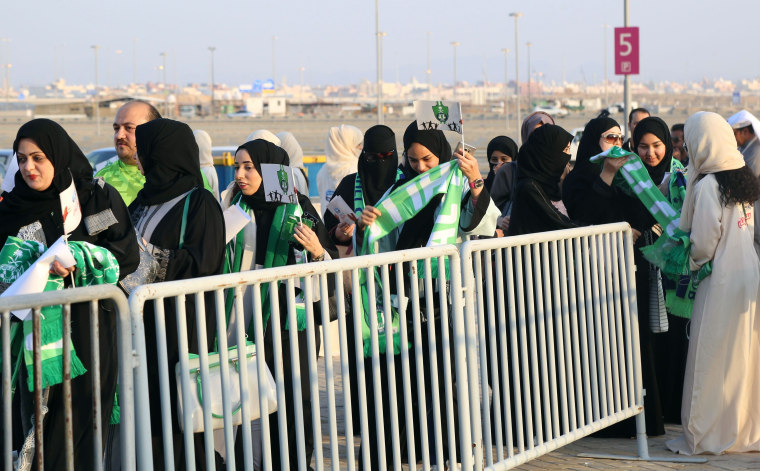JEDDAH, Saudi Arabia — Saudi women were allowed into a sports stadium for the first time Friday to watch a soccer match between two local teams — though they were segregated in the stands from the male-only crowd with designated seating in the so-called "family section."
The move was the first of Saudi Arabia's social reforms planned for this year to ease restrictions on women, spearheaded by the kingdom's 32-year-old crown prince. The kingdom has also announced that starting in June women will be allowed to drive, lifting the world's only ban on female drivers.
On Thursday, Jeddah held Saudi Arabia's first car exhibition aimed at women.
The presence of women in the sports stadium underscored a wider effort to integrate women in society and grant them more public visibility in a country where gender segregation is widely enforced and where most women cover their faces and hair with black veils and don loose-flowing black robes, known as abayas.
The first stadium to open its doors to women was in the Red Sea city of Jeddah. The stadium in the capital, Riyadh, will open to women on Saturday, followed by the western city of Dammam on Thursday.

"It's very festive and very well organized. A lot of people are just really happy to be here. I think there's a lot of excitement when you walked in, especially among the children," said Sarah Swick of the match between Saudi soccer teams Al-Ahli and Al-Batin.
Swick, who grew up in Maryland and has been living in Saudi Arabia for the past nine years, has attended football games in the U.S. and soccer matches in France, but said she was impressed with how organized Friday night's match was.
"I definitely think we will come back," she said.
To prepare for the change, the kingdom designated so-called "family sections" in the stands for women, separated by barriers from the male-only crowds. The stadiums were also fitted with female prayer areas and restrooms, as well as separate entrances and parking lots for female spectators. Local media said women would also have their own designated smoking areas.
"Family sections" are ubiquitous across the kingdom, allowing married couples, direct relatives and sometimes groups of friends to sit together, isolated from male-only tables at restaurants and in waiting areas at banks and hospitals. The sections also include women out on their own or in groups with other women.

An Arabic hashtag on Twitter about women entering stadiums garnered tens of thousands of tweets on Friday, with some using the hashtag to share photos of female spectators wearing their team's colors in scarves thrown over their black abayas.
While many welcomed the decision to allow women into stadiums, others spoke out against it.
Some used the hashtag to write that women's place should be in the home, focusing on their children and preserving their faith, and not at a stadium where male crowds frequently curse and chant raucously.
Saudi Arabia's Crown Prince Mohammed bin Salman is seen as the driving force behind the loosened restrictions on women. Still in place, however, are guardianship laws that prevent women from traveling abroad, obtaining a passport or marrying without a male relative's consent.
Set to inherit a country where more than half the population is under 25 years old and hungry for change, the young crown prince has looked to boost his popularity by curbing nearly four decades of deeply entrenched ultraconservative influence.
His reforms, which include allowing movie theaters to open in March after a more than 35-year ban, are also aimed at creating more jobs and increasing local spending on entertainment as the country faces several more years of budget deficit amid continued lower oil prices.
Many young Saudis regard his recent ascent to power as proof their generation is taking a central place in running a country whose patriarchal traditions have for decades made power the province of the old and blocked women's progress.
"Honestly this decision should have happened a long time ago," said Muneera al-Ghamdi, an attendee. "But thank god that it came in the right time, and hopefully what's to come will be even more beautiful for women.